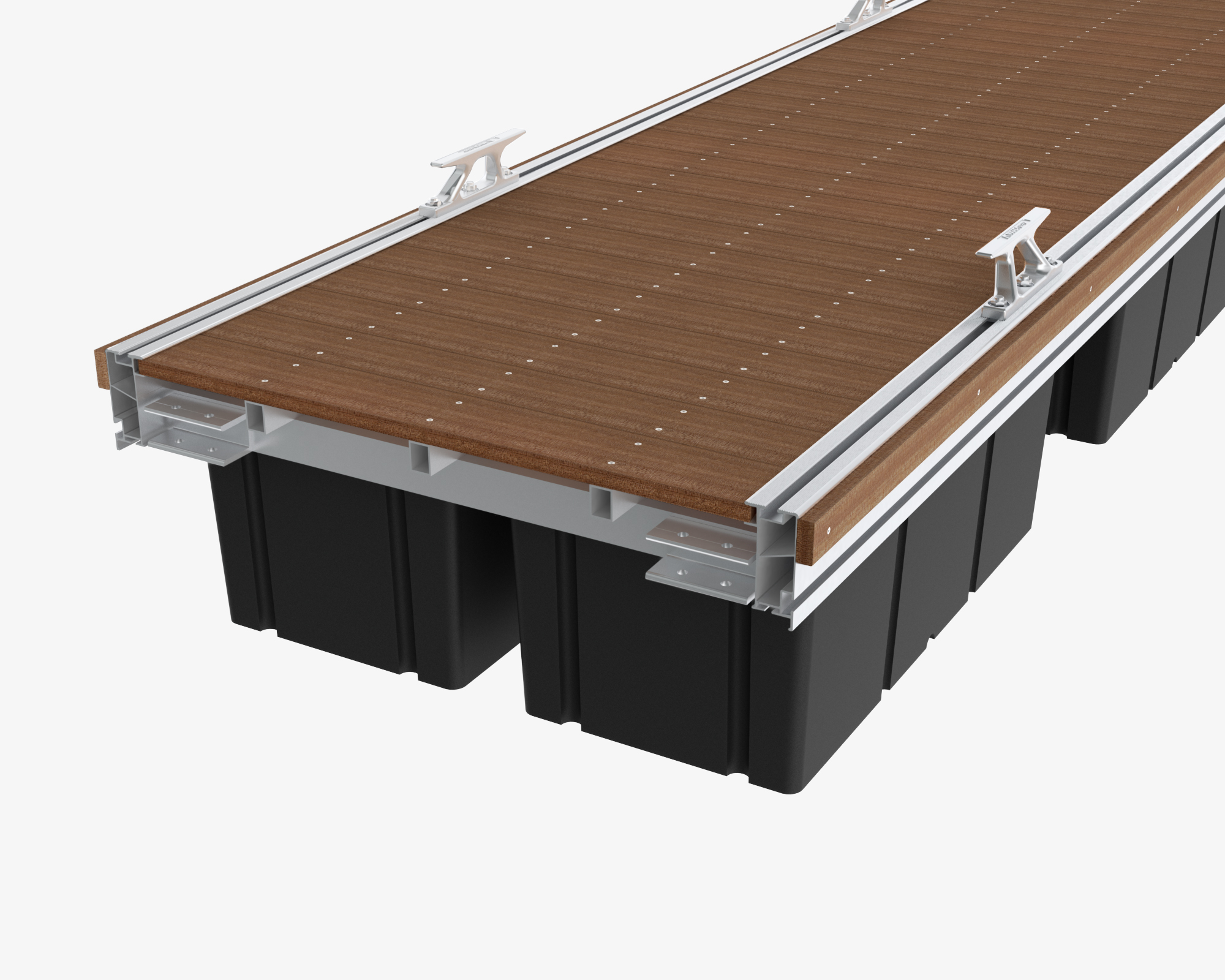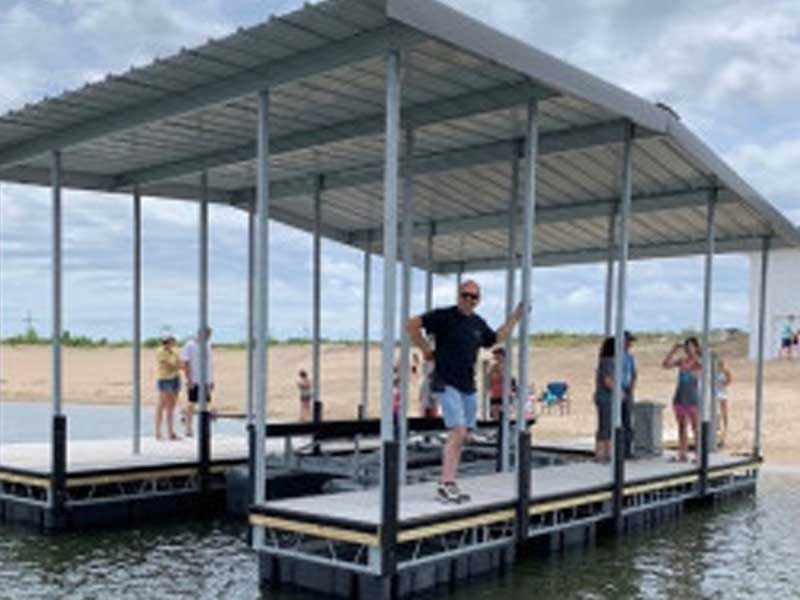The Ultimate Guide to Selecting the very best Floating Docks
Selecting the excellent floating dock requires an extensive understanding of numerous aspects that influence both performance and long life. Aspects such as dock types, products, and necessary features significantly affect your decision-making procedure.
Recognizing Floating Dock Kind
When picking a floating dock, it is important to recognize the different types available, as each serves unique purposes and applications. Floating docks largely come under 3 categories: modular, stationary, and pontoon docks.
Modular docks are made up of individual sections that can be conveniently constructed or reconfigured, making them optimal for transforming water degrees and varied usages, such as leisure tasks or industrial procedures. Their versatility allows for personalization based on specific needs.

Pontoon docks are identified by their resilient framework, commonly made up of multiple pontoons that supply security and support. They are particularly fit for larger vessels and are typically used in marinas or for beachfront properties. Comprehending these types help in selecting the most appropriate floating dock to satisfy specific needs, guaranteeing optimum capability and safety and security.
Trick Products for Toughness
Choosing the ideal products for floating docks considerably influences their durability and durability. The most common products consist of wood, plastic, metal, and composite materials, each offering distinctive advantages and constraints.
Timber, usually favored for its visual allure, calls for regular upkeep to withstand moisture and decay. Pressure-treated lumber can enhance resistance to rot, but it might still be susceptible to pests and weathering.

Plastic docks, made of high-density polyethylene (HDPE), are immune to deterioration, UV radiation, and influence, making them a popular selection for seaside settings. Their lightweight nature likewise helps with simple installment and moving.
Metal docks, generally built from light weight aluminum or galvanized steel, give exceptional strength and toughness. They are resistant to deterioration, specifically when treated, but may require added insulation to stop warmth buildup in hot climates.
Composite products, incorporating timber fibers and plastics, deliver the advantages of both timber and plastic, standing up to wetness and fading while needing minimal upkeep. - floating dock company
Ultimately, the selection of materials must align with environmental problems, meant usage, and upkeep choices to make sure the floating dock continues to be useful and visually pleasing gradually.
Important Attributes to Take Into Consideration
While the selection of materials is vital, thinking about important attributes for floating docks is similarly crucial to guarantee ideal efficiency and user fulfillment. One essential function to analyze is the dock's buoyancy capacity, which figures out just how much weight it can sustain without submerging. floating dock company. This is essential for suiting watercrafts, individual boat, and even entertainment tasks
In addition, portability is a substantial consideration. Depending upon your needs, you might desire a dock that is very easy to dismantle and deliver, specifically if you intend to relocate it seasonally. Stability is an additional essential function; a well-designed floating dock should minimize motion triggered by wind and water currents, offering a safe platform for customers.
Safety and security attributes, such as non-slip surface areas and rounded sides, are also vital to avoid accidents, particularly in damp problems. Moreover, think about the availability of accessories, such as ladders, cleats, and bumpers, which can improve the functionality of your dock.
Installation and Maintenance Tips
Establishing and maintaining a floating dock requires cautious planning and attention to detail to ensure its longevity and ideal efficiency. Begin by picking an ideal location that decreases exposure to solid currents and waves, which can create deterioration. Make certain that the water deepness is enough for the dock's elevation which look at more info it is secured safely to avoid movement.
Throughout installation, follow the manufacturer's guidelines carefully, as incorrect assembly can compromise stability. Usage top notch materials immune to rust, such as aluminum or treated timber, to improve resilience. Consistently inspect all components, consisting of drifts, ports, and securing systems, for signs of damage or wear.
If your dock makes use of flotation protection tools, ensure they remain intact and free from punctures. By adhering to these installation and upkeep suggestions, you can appreciate a functional and reliable floating dock for years to come.
Budgeting for Your Dock
Budgeting for your dock is an essential step that can significantly impact your general satisfaction and financial investment in a waterside residential property. Developing a clear budget plan assists you navigate the different choices readily available and guarantees you make informed choices that align with your financial abilities.
Begin by determining the click here for info dimension and style of the dock you need, as these factors will significantly affect the cost. Floating docks can vary substantially in price, relying on materials, buoyancy, and attributes like devices and ramps. Study various makers and vendors to contrast prices and comprehend the market worth.
In enhancement to initial prices, consider recurring expenditures such as maintenance, insurance coverage, and possible repair work. Allot funds for these recurring costs to avoid surprises down the line. It's likewise prudent to allocate any kind of necessary authorizations or inspections, which might be called for by local guidelines.
Last but not least, keep in mind the potential return on financial investment. A tactical dock can boost your residential property's value and allure, giving a favorable financial effect in the lengthy term. By budgeting efficiently, you can guarantee that your dock satisfies your needs without jeopardizing your monetary security.
Verdict
In verdict, selecting the perfect floating dock requires a detailed examination of different elements, including dock kinds, products, vital features, and setup processes. Cautious factor to consider of budgetary restraints will even more make certain an audio investment.

While the choice of materials is vital, thinking about essential features for floating docks is similarly important site vital to make sure optimum performance and individual fulfillment.Establishing up and keeping a drifting dock requires careful preparation and focus to information to ensure its durability and ideal performance. Floating docks can differ considerably in cost, depending on products, buoyancy, and functions like devices and ramps.In final thought, choosing the ideal floating dock necessitates a complete examination of different variables, consisting of dock kinds, products, crucial attributes, and installment processes.